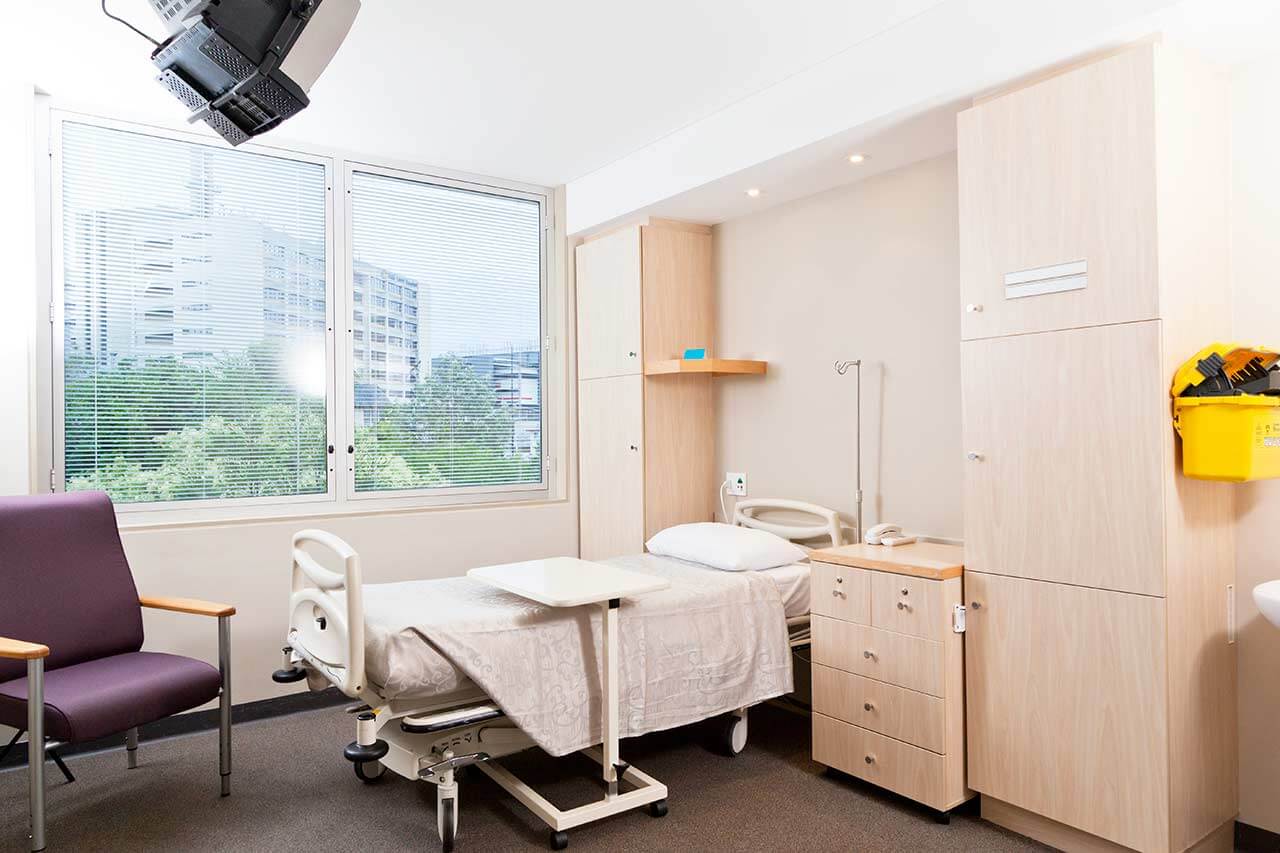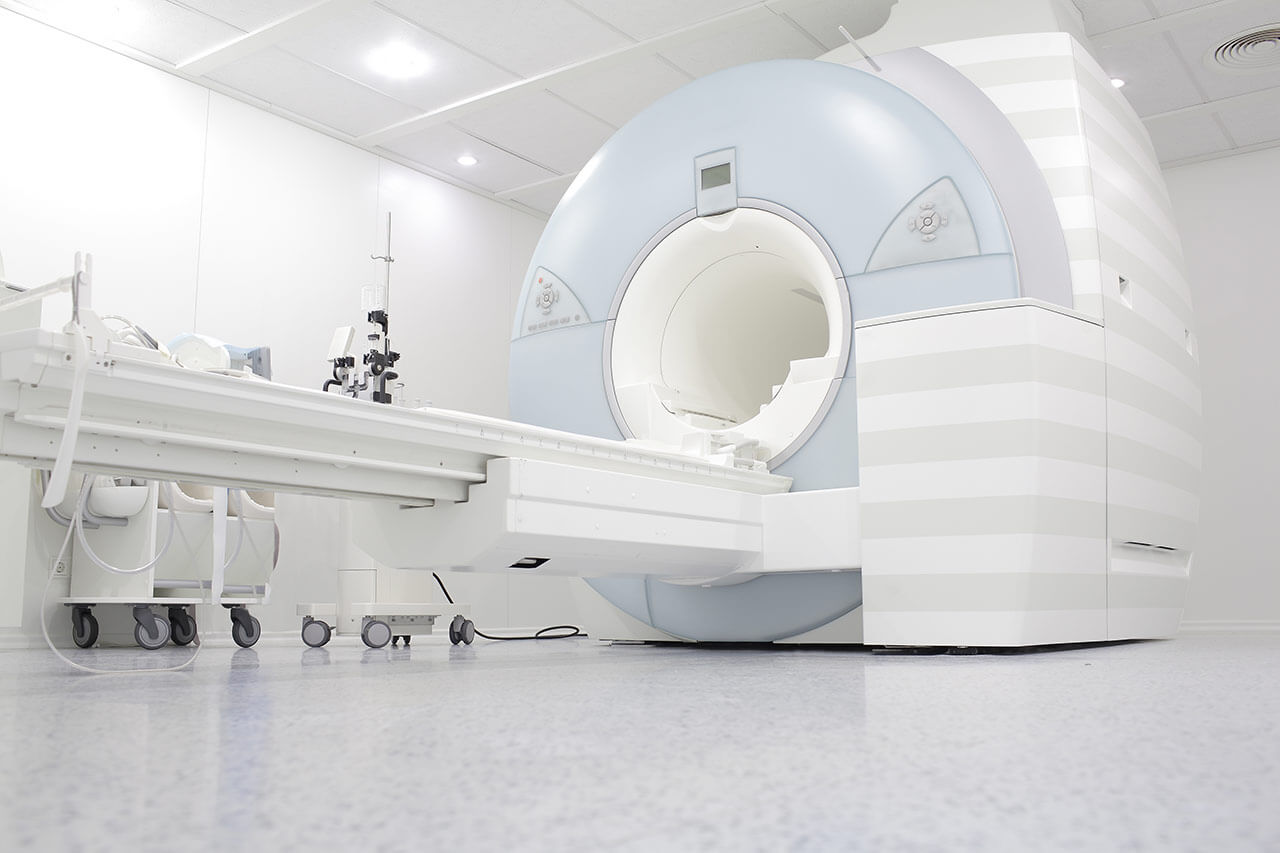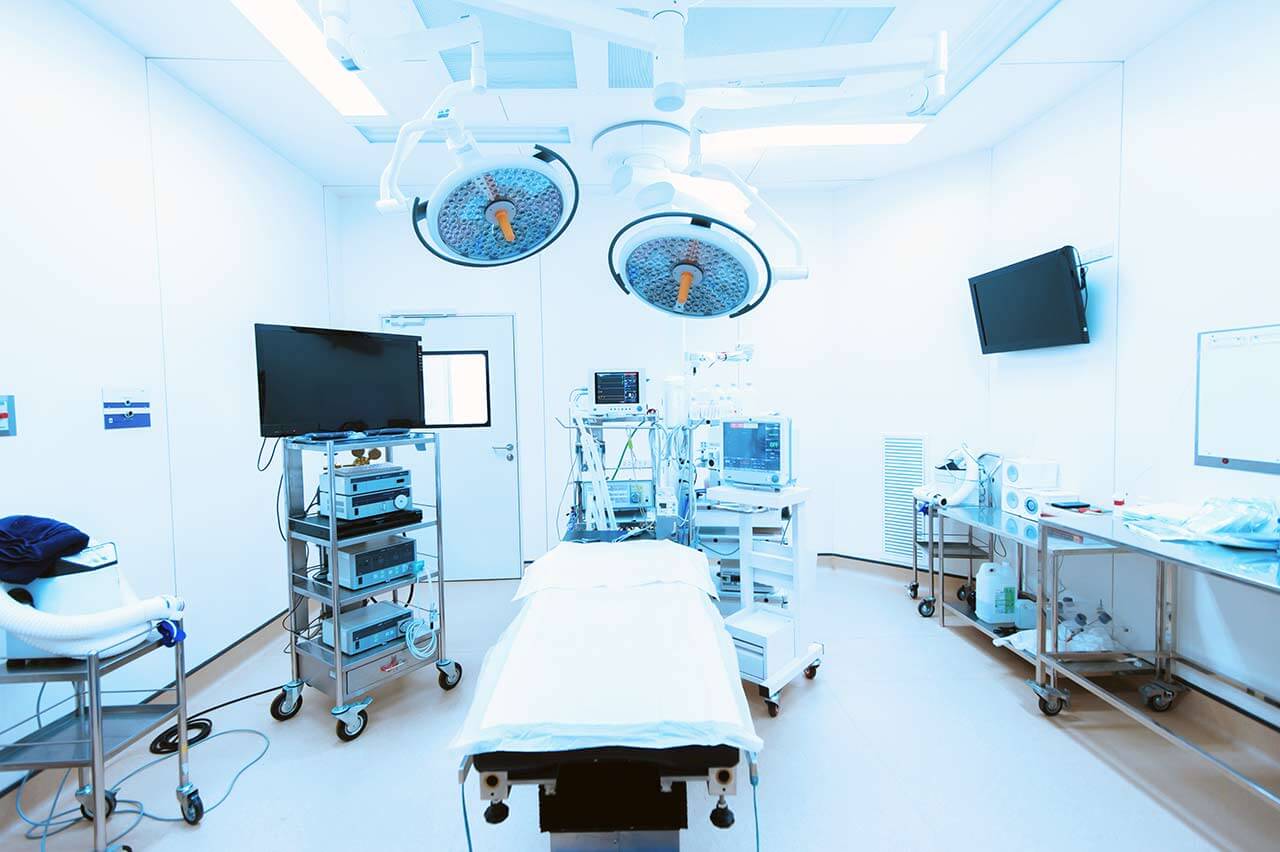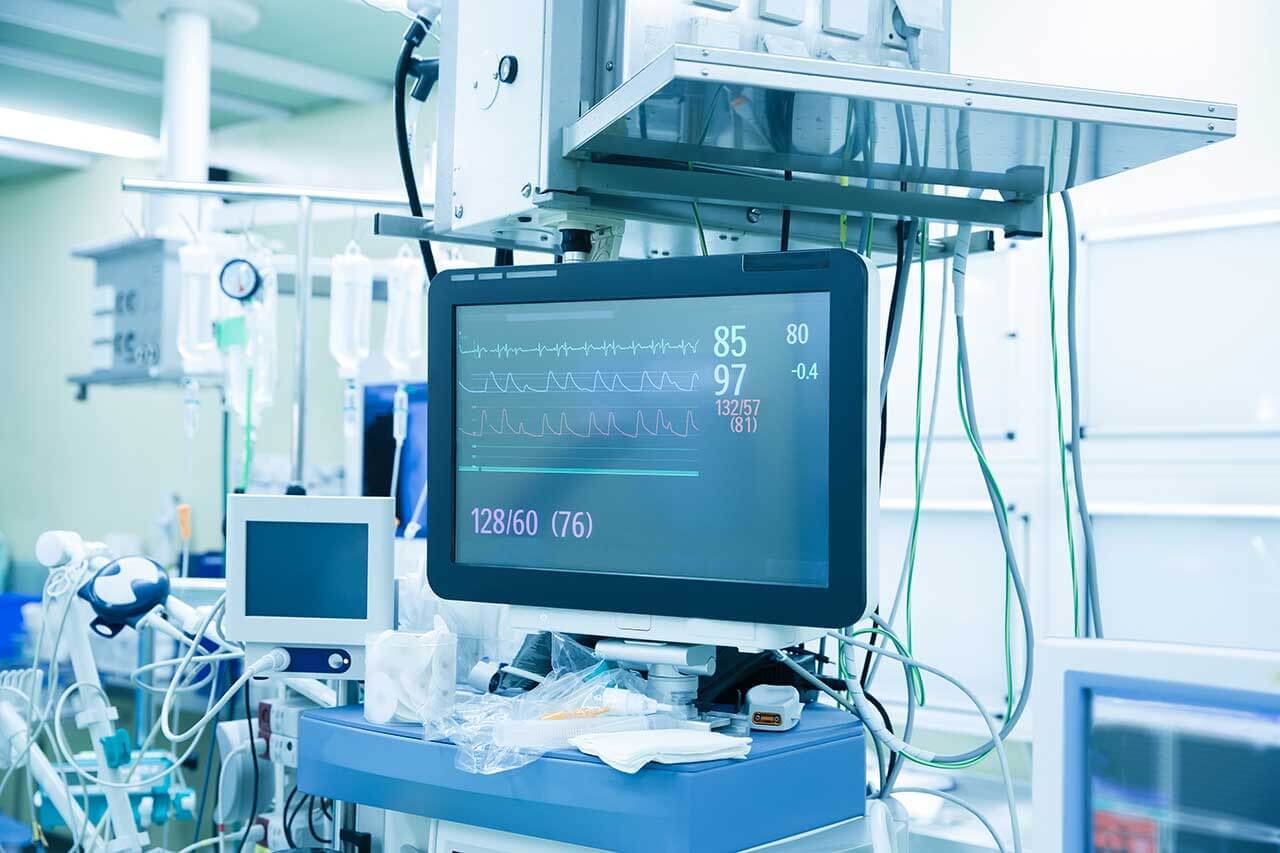
The program includes:
- Initial presentation in the hospital
- Clinical history taking
- Evaluating the available medical reports
- General clinical examination
- Urological examination
- Laboratory tests:
- Complete blood count
- Biochemical analysis of blood
- Inflammation indicators (CRP, ESR)
- Indicators of blood coagulation
- Tumor markers, PSA
- Ultrasound scan of the urogenital system
- CT scan/MRI of the abdomen and pelvis
- Preoperative care
- Removal of prostate tumor metastases with a gamma probe
- Consultations of related specialists
- Symptomatic treatment
- Cost of essential medicines
- Nursing services
- Control examinations
- Stay in the hospital with full board
- Accommodation in 2-bedded ward
- Recommendations regarding further treatment
Indications
- Confirmed prostate cancer with suspected metastasizing
How program is carried out
During the first visit, the physician will conduct a clinical examination and go through the results of the available examinations. After that, you will undergo the necessary additional examination, such as the assessment of liver and kidney function, ultrasound scan of the abdominal and pelvic organs. Based on the results, the physician will determine the number and localization of metastases, and plan the upcoming intervention.
On the eve of the intervention, you will receive an injection of radioactively labeled PSMA. PSMA is the substance that binds to the smallest prostate cancer metastases in the lymph nodes and other tissues. The radioactive label will allow the surgeon to find all the metastases during the operation.
Removal of prostate tumor metastases with a gamma probe starts with general anesthesia. After anesthesia, the surgeon makes small incisions through which he inserts endoscopic instruments, a gamma probe and a video camera into the pelvic cavity and abdominal cavity. The gamma probe detects the lymph nodes affected by metastases by a radioactive label, and the surgeon removes them endoscopically. The video camera continuously transmits a three-dimensional image of the operating field in 12-fold magnification to the monitor.
As the surgeon sees the operating field in multiple magnification, he preserves the nerve endings and large blood vessels. This significantly reduces the surgical risks. The gamma probe, in turn, allows detecting and removing all metastases, which minimizes the risk of prostate cancer recurrence.
After the completion of the operation, you will be transferred back to the ward, under the supervision of the attending physician and nursing staff. Due to the minimal invasiveness of the operation and the short duration of general anesthesia, you will not need to stay in the intensive care unit for a long time.
Finally, the attending physician will evaluate the results of control examinations, schedule the date of discharge from the hospital and give you detailed recommendations for further follow-up and treatment.
Required documents
- Medical records
- PSA blood test
- MRI/CT scan (not older than 3 months)
- Bone scintigraphy (if available)
- Biopsy results (if available)
Service
You may also book:
 BookingHealth Price from:
BookingHealth Price from:
About the department
The Department of Adult and Pediatric Urology at the University Hospital Rechts der Isar Munich provides high-precision diagnostics and effective treatment of the full range of diseases of the kidneys, urinary tract, bladder, prostate, testicles and their appendages, vas deferens and penis. The treatment of urologic cancers is of particular interest. The focus of pediatric urologists is on young patients with congenital and acquired malformations of the genitourinary system. The department has its in-house advanced operating rooms, an X-ray unit, and two stations with 57 beds. The high quality of medical care is confirmed by many prestigious certificates, including the DEKRA certificate and the certificate of the European Board of Urology. As one of the best urologic facilities in Germany and a leading urology clinic in Munich, the department has been offering patients the daVinci robot-assisted surgery since 2009, which has many advantages for patients: minimal pain, speedy recovery, the highest level of precision compared to conventional surgical interventions.
The department is headed by Prof. Dr. med. Jürgen Gschwend, who has been applying his professional skills for more than 25 years to ensure that patients with diseases of the urinary system and male reproductive system receive the best medical care. The urologist is recognized as one of the leading specialists in treating prostate cancer, kidney, and bladder tumors in Germany and has excellent qualifications in minimally invasive and da Vinci robot-assisted surgery. For many years, Prof. Gschwend has been a member of the Working Group on Urological Oncology of the German Cancer Society (DKG) and regularly works on the preparation of his scientific publications, of which he already has more than 340.
The department's priority clinical focus is on the treatment of malignant tumors of the genitourinary system. The unique experience of the department's specialists allows for successful treatment of prostate cancer, bladder cancer, testicular tumors, kidney and adrenal cancer, as well as penile cancer. If the patient is diagnosed with cancer, the department's doctors jointly study the diagnostic results and develop a treatment regimen. A tumor board gathers not only urologists, but also oncologists, nephrologists, radiation therapists, radiologists, gynecologists and other specialists. In most cases, the basis of the therapeutic protocol is surgery, chemotherapy and/or immunotherapy. The department's specialists perform surgical interventions using sparing laparoscopic or minimally invasive robot-assisted techniques.
Robot-assisted surgery using the da Vinci device has been performed in the department since 2009, so doctors have a wealth of experience and excellent clinical data in this area. The range of robotic surgical procedures includes organ-preserving removal of kidney tumors in renal cell carcinoma, radical prostatectomy in prostate cancer with the preservation of regional nerve endings and blood vessels, removal of retroperitoneal lymph nodes in testicular tumors, renal pelvis plastic repair in case of its stenosis and correction of ureteral stenosis. Such interventions allow the patient to avoid severe operative and postoperative risks typical of classical open surgery, as well as provide minimal pain and a good aesthetic result.
The treatment of kidney stone disease, kidney cysts, urinary incontinence in women and men is also of particular interest to the department's medical team. Whenever possible, preference is given to conservative therapeutic methods, but if they do not lead to the desired result, then specialists resort to surgical interventions. At the same time, almost all operations are performed using sparing minimally invasive techniques, which contributes to the patient's rapid recovery and reduced hospitalization period.
The department's main clinical activities include:
| Treatment of oncological diseases of the urological spectrum |
|
| Plastic reconstructive urological interventions |
|
| Treatment of urinary incontinence |
|
| Treatment of kidney stone disease |
|
| Treatment of benign prostatic hyperplasia |
|
| Pediatric urology |
|
| Correction of penile defects |
|
| Robot-assisted surgery (daVinci robotic system) |
|
| Other medical services |
Curriculum vitae
After studying medicine at the Ludwig Maximilian University of Munich and at the University of Ulm (1981: state examination and thesis defense) Prof. Gschwend began his internship at the University Hospital Ulm. After receiving a scholarship from the German Research Foundation, he worked at the Memorial Sloan Kettering Cancer Center (1995 - 1996). In 1998, the professor had his habilitation on the subject: "Induction of apoptosis in prostate cancer." Since 2006, Prof. Gschwend has been the Professor and Head of the Department of Adult and Pediatric Urology at the University Hospital Rechts der Isar Munich.
Prof. Gschwend's research activities are focused on surgical, clinical and experimental urology. Research projects include molecular biology of bladder and prostate cancer with an emphasis on micrometastases and signaling.
Memberships in Professional Societies
- Official Representative of the Working Group on Urologic Oncology of the German Cancer Society.
- Member of the Board of Directors and Coordinator of the German Society of Urology.
- Official Representative of the Working Group on Urologic Oncology of the German Society of Urology.
- Deputy Chairman of the Comprehensive Cancer Center Munich.
Most Significant Awards
- 2008 Award of the Faculty of Medicine and the Medical Association of the Technical University of Munich.
- 2000 Maximilian Nitze Prize of the German Society of Urology.
- 2000 Merkle Research Prize of the University of Ulm.
Photo of the doctor: (c) Klinikum rechts der Isar der Technischen Universität München
About hospital
The University Hospital Rechts der Isar Munich was founded in 1834. It combines long traditions with the very latest advances in modern medicine. The medical facility includes 33 specialized departments and 20 interdisciplinary centers, where patients can receive top-class medical care in all medical fields.
The hospital annually admits more than 65,000 inpatients for diagnostics and treatment, and about 250,000 outpatients receive effective medical care. The hospital also performs more than 40,000 surgical procedures every year, and about 2,100 babies are born here annually. One of the most significant achievements of the medical facility can be called the first transplantation of both arms above the elbow performed in 2008. The surgery that lasted 15 hours, and in which 40 doctors of various medical specialties took part, became a real sensation in the scientific world. Thanks to a unique surgical procedure, the doctors managed to give the patient new hands.
In addition, the employees of the hospital are actively involved in research activities, in which they study various diseases, as well as develop new therapeutic options for their treatment. It should be noted that the research institutes of the hospital are among the most reputable research organizations in the world. A striking example can be considered the Roman Herzog Comprehensive Cancer Center, whose specialists cooperate closely with the Comprehensive Cancer Center Munich in order to find new treatment methods for cancers.
The university hospital has a strict quality management system to maintain a high level of patient care. Since 2011, the hospital has been certified in accordance with DIN EN ISO 9001:2015 at the national and international level. The medical facility was also recertified by TÜV Rheinland in 2020.
The hospital annually provides medical services not only to German citizens, but also to thousands of patients from different countries of the world. This indicates that the hospital has an excellent reputation in the international medical arena and takes on the most complex clinical cases where other medical centers are unable to help the patient.
Photo: (с) depositphotos
Accommodation in hospital
Patients rooms
The patients of the University Hospital Rechts der Isar Munich live in comfortable single and double rooms with modern design. An accompanying person may stay with the patient in the single room. All patient rooms have an ensuite bathroom with shower and toilet. The furnishings of a standard patient room include an automatically adjustable bed, a bedside table for personal belongings, a table and chairs for receiving visitors, a wardrobe, a telephone and a TV. The patient rooms also have Wi-Fi.
The hospital also has enhanced-comfort rooms, corresponding to the level of a high-end hotel. Such patient rooms have additional amenities: a safe, a mini fridge and upholstered furniture.
Meals and Menus
The patients of the hospital are offered a balanced and healthy three meals a day: breakfast, lunch and dinner. The patients have a choice of three different menus for lunch – a classic full menu, as well as a dietary and vegetarian one. When cooking meals, the chefs comply with the current recommendations of the German Society for Nutritional Medicine (DGEM) and the German Nutrition Society (DGE).
If for some reason you do not eat all the foods, you will be offered an individual menu. The hospital also houses a cafeteria with a large assortment of hot and cold drinks, snacks and desserts.
Further details
Standard rooms include:
Religion
Religious services are available upon request.
Accompanying person
Your accompanying person may stay with you in your patient room or at the hotel of your choice during the inpatient program.
Hotel
You may stay at the hotel of your choice during the outpatient program. Our managers will support you for selecting the best option.
The hospital offers a full range of laboratory tests (general, hormonal, tests for infections, antibodies, tumor markers, etc.), genetic tests, various modifications of ultrasound scans, CT scans, MRI and PET / CT, angiography, myelography, biopsy and other examinations. Treatment with medications, endoscopic and robotic operations, stereotaxic interventions is carried out here, modern types of radiation therapy are also used. The hospital offers patients all the necessary therapeutic techniques.
- CAR T-cell therapy
- Autologous and allogeneic bone marrow transplantation
- Transcatheter aortic valve implantation (TAVI)
- Radical and organ-preserving interventions for kidney cancer
- Iridoplasty and iridotomy with Nd-YAG laser
These are acute and chronic leukemias, solid malignant tumors, heart failure, cardiac arrhythmias, heart valves stenosis and insufficiency, vasculitis, benign prostatic hyperplasia, pathologies of retina and vitreous body, Guillain-Barré syndrome, myasthenia gravis and other pathologies.
- Hematology and oncology
- Cardiology
- Nephrology
- Urology
- Ophthalmology
Over 877 highly qualified physicians work at the hospital.






